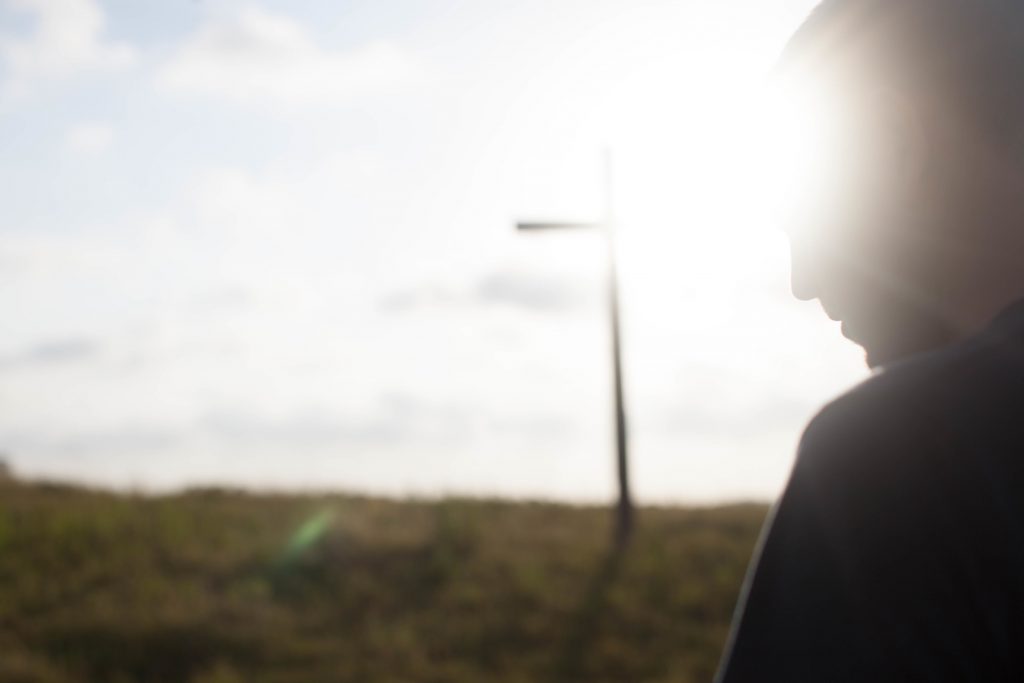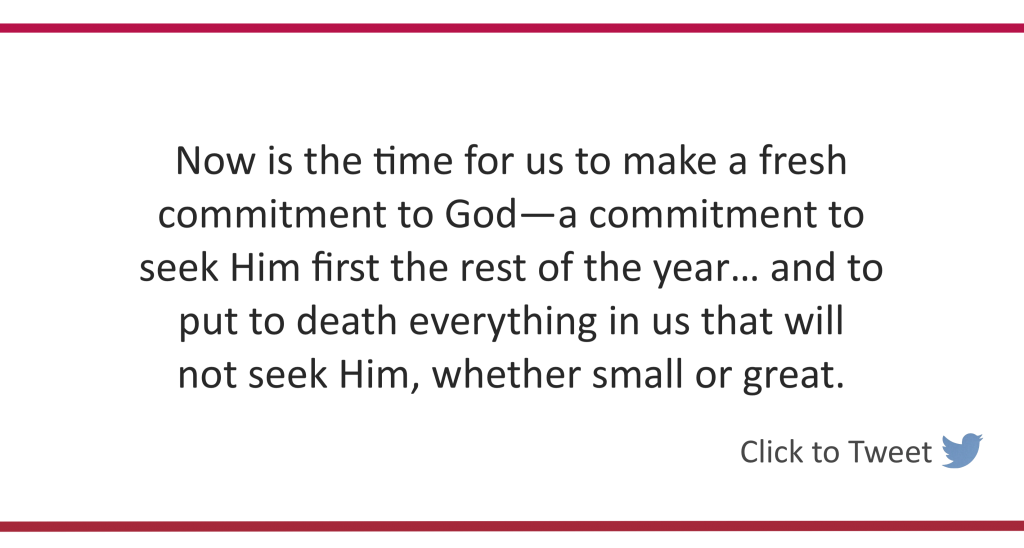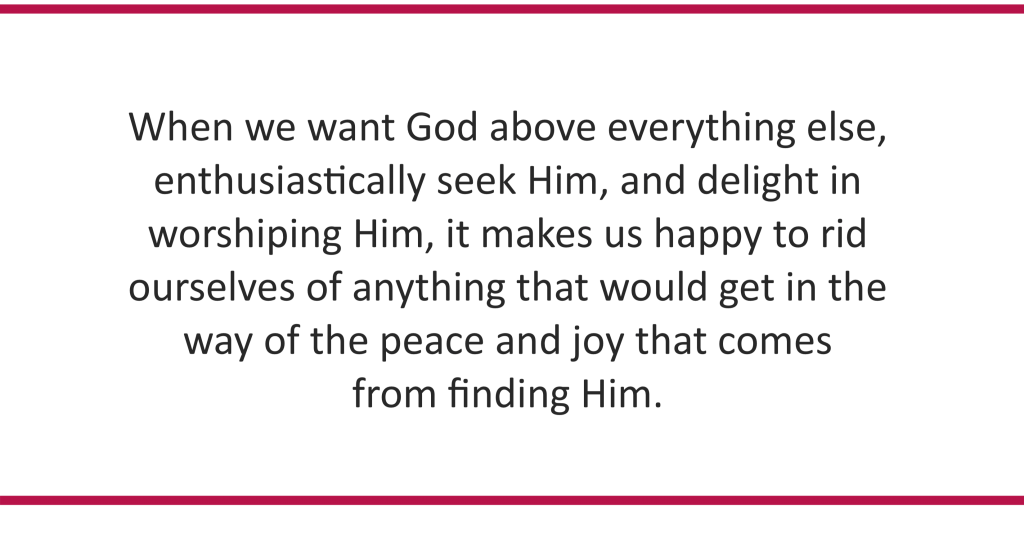Everything in Us That Will Not Seek the Lord

I believe God has a word from us from 2 Chronicles 14 and 15, especially as we seek Him in prayer and fasting. So let’s dive right in.
At first, a little background….
Background: Asa’s Reforms
2 Chronicles 14 and 15 talks about Asa, the third king of Judah following the separation of Judah and Israel. As we will see, he led Judah in sweeping reforms, most notably the removal of idolatry.
2 Chronicles 14:1-5 says,
Asa did what was pleasing and good in the sight of the Lord his God. 3He removed the foreign altars and the pagan shrines. He smashed the sacred pillars and cut down the Asherah poles. 4He commanded the people of Judah to seek the Lord, the God of their ancestors, and to obey his law and his commands. 5Asa also removed the pagan shrines, as well as the incense altars from every one of Judah’s towns. So Asa’s kingdom enjoyed a period of peace. (NLT)
This chapter later gives an account of a battle with Ethiopia. Judah had two armies totaling 580,000 men. Ethiopia attacked Judah with an overwhelming army of 1,000,000,000 men. Helpless against them, King Asa cried out to God:
“O Lord, no one but you can help the powerless against the mighty! Help us, O Lord our God, for we trust in you alone….” (2 Chronicles 14:11, NLT).
As a result, God gave Judah victory over Ethiopia. Afterward, the Spirit of God came upon the prophet Azariah. He went out to meet King Asa and shouted,
“Listen to me, Asa!” he shouted. “Listen, all you people of Judah and Benjamin! The Lord will stay with you as long as you stay with him! Whenever you seek him, you will find him. But if you abandon him, he will abandon you. 3 For a long time Israel was without the true God, without a priest to teach them, and without the Law to instruct them. 4 But whenever they were in trouble and turned to the Lord, the God of Israel, and sought him out, they found him.
5 “During those dark times, it was not safe to travel. Problems troubled the people of every land. 6 Nation fought against nation, and city against city, for God was troubling them with every kind of problem. 7 But as for you, be strong and courageous, for your work will be rewarded.” (vv. 2-5, NLT)
King Asa and Judah had just experienced a huge victory over a mighty army. It would have been easy for them to have thought that God’s blessing would always be upon them. They could have naturally presumed that His favor and peace and victories such as these would be guaranteed. But it’s obvious in this passage that God wanted Asa to know that he and the people needed to abide in Him.
Asa responded accordingly:
When Asa heard this message from Azariah the prophet, he took courage and removed all the detestable idols from the land of Judah and Benjamin and in the towns he had captured in the hill country of Ephraim. And he repaired the altar of the Lord, which stood in front of the entry room of the Lord’s Temple. (v. 8, NLT, emphasis added)
King Asa removed the idols from the land. And he even burned the idolatrous symbol of his grandmother Maachah’s religion and deposed her from being the “queen mother” (v.16) In addition, he renewed the altar of the Lord which idolatrous priests had desecrated.
Judah’s Covenant With God
The people of Judah made a covenant with God, which is documented in the next chapter, 2 Chronicles 15:
9 Then Asa called together all the people of Judah and Benjamin, along with the people of Ephraim, Manasseh, and Simeon who had settled among them. For many from Israel had moved to Judah during Asa’s reign when they saw that the Lord his God was with him. 10 The people gathered at Jerusalem in late spring, during the fifteenth year of Asa’s reign.
11 On that day they sacrificed to the Lord 700 cattle and 7,000 sheep and goats from the plunder they had taken in the battle. 12 Then they entered into a covenant to seek the Lord, the God of their ancestors, with all their heart and soul. 13 They agreed that anyone who refused to seek the Lord, the God of Israel, would be put to death—whether young or old, man or woman. 14 They shouted out their oath of loyalty to the Lord with trumpets blaring and rams’ horns sounding. 15 All in Judah were happy about this covenant, for they had entered into it with all their heart. They earnestly sought after God, and they found him. And the Lord gave them rest from their enemies on every side. (2 Chronicles 15:9-15, NLT)
The people of Judah made a covenant to seek God with all their heart and soul. They agreed that anyone who would not seek God—no matter how sympathetic, likable, or endearing—would be put to death. Do you think they were serious about their commitment to seek God and be wholly His? Yes!
Verse 15 tells us they were happy about their commitment to God. Even though Asa provided the leadership and direction, each person decided of their own volition to commit for himself to seek God earnestly.
The idea of putting people to death for idolatry came from God’s law (see Deuteronomy 17:1-7). Obviously we don’t literally put people to death for sin now because Jesus came, fulfilled the law, and paid the price for our sins, so we live under grace, not law. The cross changed everything.
But even on this side of the cross there is still a powerful spiritual application for us from this passage today.
A Word from God to Us
One day a while back, I came across this passage in my daily Bible reading, and verse 13 stuck out to me.
“All who would not seek the Lord, the God of Israel, were to be put to death, whether small or great, man or woman” (v. 13, NIV).
It was as if the words leapt off the page. The Holy Spirit spoke to my heart and convicted me. I wrote the date and this message from God in the margin of my Bible:
“Everything in me that will not seek the Lord, whether small or great, is to be put to death.”
Beloved, before you and I leave this fast, we must revisit this exhortation.
Now is the time for us to make a fresh commitment to God—a commitment to seek Him first the rest of the year… and to put to death today everything in us that will not seek Him. Whether it is something small or great—something negligible and relatively unimportant to us, or something great we cannot imagine living without—now is the time to put it to death, to remove it entirely from our lives.

If you’ve been fasting with the right motives and have been incorporating time in prayer and the Word, then no doubt you’ve already put some things to death.
Some of things you put to death aren’t inherently bad; they were just things you tended to prioritize over seeking God—they had become idols in your life. Other things were outright immoral or celebrated immorality. For example, while fasting you’ve felt convicted watching certain television programs you watched up until the week of the fast. When you are gazing on God’s face through prayer and fasting, it’s hard to be entertained by godlessness and sin.
Some things that keep us from seeking God masquerade as innocent, or natural, or humble—things such as doubt. When we doubt God, we refuse to actively believe Him. We refuse to trust Him to work His will in our lives. We doubt He can or will keep His promises to us. That’s unbelief… and it grieves the heart of God. Doubt isn’t always overt. Sometimes it’s covertly disguised as realism. I’m sure the ten spies who scoped out the promised land justified their unbelief as “realism.” But it wasn’t realism, it was unbelief—an affront to God. It minimized His power and ability and refused to trust Him and walk in his Word. Such unbelief should have been put to death.
Another example of a way we fail to “seek” God is when we refuse to elevate Him first in our finances through tithing. Perhaps it’s because we idolize material possessions—because we refuse to believe what God has said about the location of our ‘real’ home and that we’re to be storing up treasure there. … Or perhaps we don’t honor God with tithes and offering because of fear of repercussions from unpaid bills—we don’t trust God to do what He promised in scripture and meet our need. This again is unbelief. It’s idolatry and sin. Adrian Rogers writes,
“You can say all you want about getting right with God, but if you don’t get right with God in your finances, you are not right with God. The kind of repentance that does not reach the bank account, has never reached the heart.”
A third example of how we fail to seek God is by forsaking church attendance. Scripture exhorts us in Hebrews 10:25 not to stay away from our worship meetings, as some habitually do. After spending months with Dad in the hospital and not getting to attend church, I can attest to how it affects you spiritually. I watch online, and listen to sermons and worship music online constantly. But it’s not the same.
Do you see from these examples how extensive the reforms in our own lives and hearts and minds need to be? They need to be as sweeping as that of Judah’s. There are countless idols in our lives—countless obstacles to seeking God and elevating Him first—that need to be put to death.
How Fasting Helps
When we practice fasting rightly, we become more sensitive to God’s voice and His heart. We hear His voice more clearly and feel His grief over our sin more readily.
As we focus less and less on this temporal world, and dwell with God more and more in prayer and the Word, which causes us to gaze upon His holiness, we find that we long to be like Him. We realize what rubbish we had come to treasure, and how we had turned things upside down. We had come to view down as up and up as down. We were valuing what’s worthless, trashing what’s priceless, viewing the temporal as permanent and the eternal as too far away to matter today. Before we began this fast, we weren’t living as if our citizenship is in heaven and our real life is hidden with Christ in God (Phil. 3:20; Col. 3:3-4).
Fasting brings body and soul into subjection to the Holy Spirit, causing our human nature, which is hostile to God, to be brought under His authority. Consequently, our perspective is corrected to that which is accurate.
Andrew Bonar said, “Fasting is abstaining from anything that hinders prayer.” If we apply 2 Chronicles 15:13 to this statement, we could say that fasting is abstaining from anything “that will not seek God.”
You’ve already begun a spiritual purge of your own during these days of fasting. You’ve begun to abandon certain things that have kept you from seeking God.
But before we exit the fast, let’s ask God to clean our lives out entirely of all idolatry and hindrances to seeking Him. During these remaining days of the fast, let’s prayerfully reflect on our lives and ask God to show us what things, however wicked or seemingly harmless they may be, are keeping us from pursuing Him and elevating Him to first place in our lives.
That Which Will Not Seek God: An Honest Assessment
Let’s ask God to help us honestly assess our lives and take inventory of the idols and hinderances in our “land”—and help us happily make a covenant to seek Him the rest of this year.
What kept you from seeking God before this fast? Was it:
- A relationship? Is there someone in your life who keeps pulling you away from God?
- How you allowed your schedule to be determined? Did you not allow time for prayer and the Word?
- Entertainment? Either through a stealing of your available time for prayer or through the sinful influence of the content?
- Forsaking church attendance and fellowship with Christ’s body?
- What you did with God’s tenth of your income instead of giving it to Him?
- Unbelief—doubting God wants to be found?
Since it kept you from seeking God, did you stop it temporarily for the fast? But only temporarily? Had you planned on returning to the activity as soon as the fast was over? Beloved, if it is something that will prevent you from earnestly pursuing God, you need to put it away permanently!

- Comfort?
- Entertainment?
- Leisure?
- Work?
- Errands?
- Sports?
- People?
- Social Media?
- Temporal success?
- Riches?
Take this time to pray and renounce the hold these things have had on you. Repent of the idolatry. Make a choice to put God first and no longer prioritize these things above Him. If you need to rearrange your life some in order to not have these idolatries creep up on you again, make those plans and decisions now. There are practical steps you can take while you’re on the fast that will help you walk out this commitment the rest of the year.
King Asa’s Response, and Ours
Our honest assessment will be helped by observing two things about Asa:
1. Asa was thorough.
Asa brought the reforms enter his own house. He didn’t enact them in the rest of the kingdom but keep them out of his household. No, he deposed his very own grandmother and destroyed what was dear to her, her abominable image of Asherah.
You and I should be thorough, too, and not have any area of our lives off limits to God in this assessment. Nothing anywhere—nothing in our schedule, our priorities, our bank account, our relationships, our pantry, our DVR, our radio, our NetFlix account, etc.—should be off limits to God. When we ask Him to show us what needs to be put to death, may we leave the door wide open to Him.
2. Asa was courageous.
Removing the idols and reforming the nation took great courage for King Asa. He had to combat some major obstacles:
- Idolatry was entrenched in the people’s hearts and lives. This gave them a strong tendency to favor idolatry.
- There were unseen spiritual forces at work who also favored idolatry. Serious spiritual warfare had to take place.
- The examples of his predecessors favored idolatry, as did the neighboring tribes to the north.
- Asa had to combat his own human, fleshly tendencies toward compromise and idolatry, tendencies you and I have as well.
- Then there was the extensive compromise and indifference of the nation that supported and promoted idolatry just as it does in our nation, and even in the Church, today. [1]
Removing the idols in our lives will take no less courage than it did for King Asa. But God will enable us to do it! He will give us courage and strength!
Restoring the Altar
King Asa didn’t just remove the wrong, he restored the right. He restored the altar of God that had been desecrated.
You and I aren’t just removing what’s wrong, we’re restoring the right. As we abstain from anything that hinders our prayer and seeking during this fast, we’re careful to replace those things with actual prayer, actual seeking, actual time in the Word.
The same goes here. For example, if we make a commitment to remove the idols in our music choices, things that hinder us from seeking and experiencing God, then on the flip side, we choose to listen to God-honoring music, music that correctly orients our focus and worships God. We build an altar to God in our music listening.
Or if we commit to stop the idolatry in our bank account, then we must do the flip side and honor God in our finances through tithes and offerings. We place those funds on God’s altar in worship every time we give.
We restore the altar…
People Came in Great Numbers
Interestingly, people came in great numbers from Israel to Judah when they saw King Asa’s commitment to God and that as a result, God was with him.
“For many from Israel had moved to Judah during Asa’s reign when they saw that the Lord his God was with him” (2 Chronicles 14:9).
The godly remnant in the northern tribes of Israel respected Asa’s bold, courageous obedience. Living among apostasy, they wanted to be part of this committed return to God.
When you overhaul your life, there may be some around you who are not pleased. But at the same time, many people will respect you and want to join you. Your actions will inspire them to do the same.
So don’t be discouraged if you only experience the reaction of those who are displeased. You may not be aware of it, but somewhere, possibly among your own family, or work colleagues, or church congregation, there will be those who will be positively impacted by your commitment to God. Don’t lose heart.
Judah’s Attitude Is Telling
Exploring different translations of verse 15 gives us a better picture of the people’s attitude toward their covenant and seeking:
- All Judah was delighted with the solemn pledge because they had sworn it with all their hearts…. They enthusiastically sought God… (CEB)
- All Judah rejoiced over the oath… (ESV)
- All in Judah were happy about this covenant… (NLT)
- All the people… were overjoyed because of the oath, since they took the oath wholeheartedly. They took great pleasure in looking for the Lord… (GW)
- All the people… were happy because they had made this covenant…. They took delight in worshiping the Lord… (GNT)
- All were happy for this covenant with God, for they… wanted him above everything else… (TLB)
- They shouted out their promise to God, a joyful sound accompanied with blasts from trumpets and rams’ horns. The whole country felt good about the covenant promise—they had given their promise joyfully from the heart. (MSG)
This is telling isn’t it? Otherwise, if we simply read verse 15 about them putting people to death, we would presume this whole endeavor of cleansing their communities and seeking God first was horrific and sorrowful—something they were forced unwillingly to undertake.
No, happy and overjoyed about their covenant, they enthusiastically sought God and took great delight in worshiping Him because they wanted Him above everything else!
You and I can adopt the same attitude and mindset about our pursuit of God and our covenant with Him.
When you think of putting to death everything that will not seek God, does it make you happy? Overjoyed even?
When we want God above everything else, enthusiastically seek Him, and delight in worshiping Him, it makes us happy to rid ourselves of anything that would get in the way of the peace and joy that comes from finding Him. We’ll give God our “promise joyfully from the heart” any day because of how it causes us to experience Him.

The Result: They Found God and He Gave Them Peace
God promised Asa through Azariah that when they sought Him, they would find Him.
“Whenever you seek him, you will find him” (2 Chronicles 15:2).
In verse 15, we see that God did what He said he would do. He was found by them.
- When they enthusiastically sought God, he was found by them, and the Lord gave them peace on every side. (CEB)
- Anticipating the best, they had sought God—and he showed up, ready to be found. God gave them peace within and without…. (MSG)
- They willingly sought the Lord and he responded to them. He made them secure on every side. (NET)
- They took great pleasure in looking for the Lord, and he let them find him. So the Lord surrounded them with peace. (GW)
- They earnestly sought after God, and they found him. And the Lord gave them rest from their enemies on every side. (NLT)
God responded to them. He showed up, ready to be found! And he gave them peace within and without!
Do you need peace within? Are there some things about which you need internal peace? Are you stressed, fearful, or anxious? Are you frustrated about this season of your life, confused about why God could possibly have allowed your circumstances? You need peace within!
Do you need peace without—peace in your home, peace in your career, peace in your finances, peace in a personal relationship, peace in a professional relationship, peace in a battle with an enemy?
When you take great pleasure in looking for the Lord, He will respond. He will let you find Him and surround you with peace, peace within and without!

Prayer
Father, show us what things in our lives will not seek You. Show us what we’ve elevated and idolized above You, and help us rid our lives of them. Reveal to us the sin and unrecognizable idolatry we’ve allowed to creep in. Show us how we’ve allowed even Your good gifts to impair our commitment to You. Help us do an honest assessment and thoroughly clean our spiritual house.
May we happily, joyfully rid ourselves of the things that are keeping us from You, and preventing us from experiencing real peace and joy. Help us to want YOU above everything else and to take delight in worshiping You.
Give us grace the rest of the year to seek You with our whole heart—with all our desires, priorities, choices, activities, possessions, and time. May we do as Judah did and seek you earnestly and enthusiastically. May we take great pleasure in looking for You.
Father, we thank you advance for being found—for letting us find you and for giving us peace within and peace without!
Help us maintain this level of sensitivity to You all year long—to the things in our lives that become idols, things we direct worship and attention to instead of You. As new things emerge this year that keep us from seeking You, help us recognize them and rid ourselves of them immediately.
May everything we are and have bring glory and honor and worship to You! In Jesus’ name, so be it.
Yearning For Him
And all Judah rejoiced at the oath, for they had sworn with all their heart and sought Him [yearning for Him] with their whole desire, and He was found by them.
2 Chronicles 15:5, AMPC
Yearning for God is the key. When we yearn for Him strongly enough, we will do anything, put anything to death and rid our lives of anything—in order that we might seek Him with our whole heart… and find Him.
On that note, let’s have a moment of worship with “Yearn” by Shane and Shane.
A Moment of Worship: Yearn
Yearn by Shane and Shane
From the Album: Upstairs
Listen on Apple Music | Download from iTunes
Listen on Prime Music | Download from Amazon
Bible Reading: 2 Chronicles 14 – 15; Psalm 105:3-4, AMPC; Romans 12:1-2
Questions:
- Will you make a fresh commitment to God—a commitment to seek Him first the rest of the year… and to put to death today everything in you that will not seek Him?
- What is keeping you from seeking God? Is it:
- A relationship—is there someone in your life who keeps pulling you away from God?
- Your schedule—do you not allow time for prayer and the Word?
- Entertainment—either through a stealing of your available time for prayer or through the sinful influence of the content?
- Forsaking church attendance and fellowship with Christ’s body?
- What you do with God’s tenth of your income instead of giving it to Him?
- Unbelief—doubting that God wants to be found?
- What other gods have you served? What things have you elevated above God?
- Will you be thorough and not have any area of your life off limits to God in this assessment?
- Will you happily rid yourself of the idols you have put above God? Will you joyfully put to death everything in your that will not seek Him?
- Are you taking great pleasure in looking for the Lord? Do you want Him above everything else?
- What results of finding God are you most looking forward to? The peace within and without? The security? The fellowship with Him?
FASTING DAY SEVENTEEN FROM THE ARCHIVES
- Satan Trembles When He Sees the Weakest Saint Praying
- The Stewardship of Fasting by J.G. Morrison (Part 1)
- Fasting Is Relationship
- Fasting Day 17: Breaking Negative Emotional Habits
- Clean Slate by Jentezen Franklin
- Desperate Prayer by Leonard Ravenhill
- Fasting Day 17: The Gospel of Prayer (by Leonard Ravenhill)
- Fasting with Friends from Around the World
- Fasting Day 17: Back Into the Arms of Our Beloved
____________________
- Guzik, David. Study Guide for 2 Chronicles 15. https://www.blueletterbible.org/Comm/guzik_david/StudyGuide2017-2Ch/2Ch-15.cfm. Accessed January 19, 2020.

Disclosure of Material Connection: Some of the links in the post above are “affiliate links.” This means if you click on the link and purchase the item, Shades of Grace will receive an affiliate commission. Regardless, I only recommend products or services I use personally and believe will add value to my readers. I am disclosing this in accordance with the Federal Trade Commission’s 16 CFR, Part 255 “Guides Concerning the Use of Endorsements and Testimonials in Advertising.”







 “Natalie Grace Nichols is experiencing God’s grace and freely expressing it. My wife, Betty, and I thank God for the ministry of Jesus through Natalie.”
“Natalie Grace Nichols is experiencing God’s grace and freely expressing it. My wife, Betty, and I thank God for the ministry of Jesus through Natalie.” “I’m so thankful that God is raising up women like Natalie for a new generation, providing biblically balanced teaching, encouragement, and comfort for people who are enduring life’s trials.”
“I’m so thankful that God is raising up women like Natalie for a new generation, providing biblically balanced teaching, encouragement, and comfort for people who are enduring life’s trials.”
Andrew Bonar said, “Fasting is abstaining from anything that hinders prayer.
OH MY LORD
I have failed miserably. I have been avoiding eating but eating up distractions work, entertainment, busyness. I am going to start over again.
Pray about what you are to do, whether to start over completely, or just capitalize on these last days of the fast… or whether to add a week on to your fast. As I said in a couple of other places (such as here: http://bit.ly/2AYBsy3), when you mess up on your fast, you just get up and keep going. It's a marathon not a sprint. Typically, I advise people that if they mess up, to just pick up on the current day of the fast and keep going. Otherwise many of us would be beginning our 21 days over once a week or so. 🙂
However, God may be leading you differently since it was not food you messed up on, but it was failing to pray. Often during Pursuit 21, because I am extra busy—especially if I don't have the opportunity to do the writing, posting, graphic design, etc., and things ahead of time—I want more time for prayer while fasting. So I will continue my fast when Pursuit 21 is over, either for an extra week, 10 days, or go 40 days total or something, depending on how I feel God is leading me. This might be something you want to do as well.
One thing is for sure, if you had not been fasting, God would not have given you this revelation. Because you were fasting, you were able to see this word from Him and receive conviction from the Holy Spirit. So your fast has not been a waste!!! Be encouraged!!!
I am praying for you, that God will enable you to put aside the distractions and draw near to Him in PRAYER!
Natalie